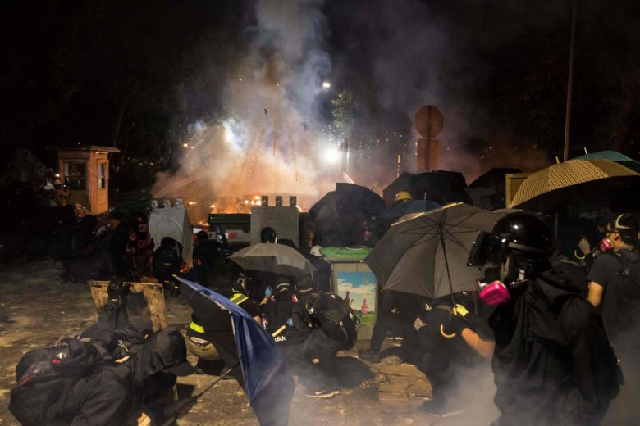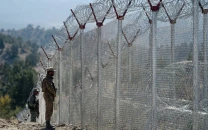US Senate passes Hong Kong rights bill, angering China
China summons top US diplomat, warns of 'strong' countermeasures against US if legislation signed into law

Protesters shelter behind their barricade during clashes with police at the Chinese University of Hong Kong. PHOTO: AFP
The lawmakers also approved a measure that would ban the sale of tear gas, rubber bullets and other equipment that have been used by security forces to suppress pro-democracy protests for nearly six months.
Chinese vice foreign minister Ma Zhaoxu summoned the acting US charge d'affaires, William Klein, to lodge a "strong protest" and demand that the US prevent the bill from becoming law. US ambassador Terry Branstad was out of the country.
"Otherwise, the Chinese side will take strong measures to resolutely counter it, and the US side must bear all the consequences," the statement said.
A US embassy spokesman said Klein "relayed that we are watching the situation in Hong Kong with grave concern" during the foreign ministry meeting.
US, China step up war of words over Hong Kong
China had also reacted angrily when the US House of Representatives passed a similar measure last month.
The Senate's Hong Kong Human Rights and Democracy Act would require the US president to annually review the favorable trade status that Washington grants to Hong Kong.
It also mandates sanctions against Hong Kong and Chinese officials who commit human rights abuses including "extrajudicial rendition."
The Senate "sent a clear message to Hong Kongers fighting for their long-cherished freedoms: We hear you, we continue to stand with you and we will not stand idly by as Beijing undermines your autonomy," Republican Senator Marco Rubio said.
Passage of the bill marks "an important step in holding accountable those Chinese and Hong Kong government officials responsible for Hong Kong's eroding autonomy and human rights violations."
The Senate Foreign Relations Committee's top Democrat, Robert Menendez, added that the legislation "makes it clear that the US will stand firmly and unambiguously with the legitimate aspirations of the people of Hong Kong."
Chinese foreign ministry spokesman Geng Shuang said the US purpose was to "support the extremists and violent elements against China that are trying to mess up Hong Kong... and realise their sinister plot to hinder China's development by taking advantage of the Hong Kong issue."
The pro-democracy movement was ignited in June when millions took to streets in opposition to a now-abandoned attempt to allow extraditions from Hong Kong to the mainland.
The protests and resulting crackdowns have turned parts of Hong Kong into violent battlegrounds for weeks.
On Tuesday protesters occupying a university defied warnings to surrender, as skirmishes between police and demonstrators continued.
The Senate bill updates the original Hong Kong Policy Act of 1992.
Senator Ben Cardin noted how Hong Kong has enjoyed a special economic status for years, one that relied on authorities "protecting democracy and human rights" in the territory.
"That was the commitment. And if they don't comply with that, the special status should no longer be available," Cardin said.
The House and Senate will now harmonize the texts into a single bill to pass Congress and go to President Donald Trump's desk for his signature.



















COMMENTS
Comments are moderated and generally will be posted if they are on-topic and not abusive.
For more information, please see our Comments FAQ